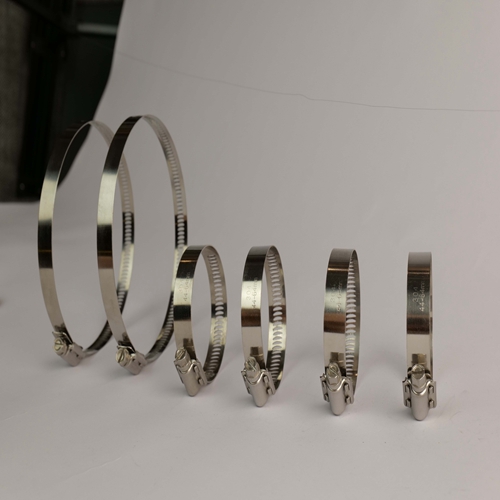- Phone:+86-17331948172 +86-0319-8862898
- E-mail: inquiry@puxingclamp.com
Dec . 19, 2024 07:10 Back to list
Top Hose Clamps for Secure and Reliable Transmission Line Connections
The Best Hose Clamps for Transmission Lines Essential Guide for Optimal Performance
Hose clamps may seem like small, inconspicuous components in the world of automotive mechanics, but their role in ensuring the seamless operation of transmission lines is undeniably significant. Transmission lines play a crucial part in transferring power from the engine to the wheels, and any failure in this system can lead to costly repairs and potential safety hazards. Selecting the right hose clamps for these applications can lead to better performance, enhanced reliability, and a longer lifespan for your vehicle.
Understanding Hose Clamps
At its core, a hose clamp is a device that attaches and secures a hose onto a fitting such as a barb or a nipple. In the context of transmission lines, they are used to prevent fluid leaks, maintain consistent pressure, and ensure that fluids are directed where they need to go. Without high-quality clamps, the risk of leaks can increase dramatically, leading to overheating, fluid loss, and even catastrophic failure of drivetrain components.
Types of Hose Clamps
There are several types of hose clamps available on the market, and understanding the differences between them can help you make an informed choice
1. Screw-Type Hose Clamps These are the most common type of hose clamp, featuring a threaded screw that tightens or loosens the clamp. They offer reliable clamping force and are easy to adjust. They come in various materials, including stainless steel, which is ideal for high-performance applications.
2. Spring Clamps These clamps use a spring mechanism to maintain pressure. They are often used in applications where vibrations occur but may not provide as secure a fit as screw-type clamps, especially under high-pressure situations.
3. T-Bolt Clamps Ideal for larger diameter hoses, T-bolt clamps feature a T-shaped bolt that provides more even pressure distribution. This type is particularly useful in high-pressure applications like turbochargers or superchargers.
4. Ear Clamps These are often used in automotive applications and are a more permanent solution. They require special tools for installation and removal, which can limit their practicality in environments where maintenance is a concern.
Material Considerations
When selecting hose clamps for transmission lines, the material choice is crucial for performance and longevity
best hose clamps for transmission lines

- Stainless Steel Highly resistant to corrosion and ideal for use with fluids that may lead to rust and deterioration. Look for 304 or 316 stainless steel, as these grades provide the best protection in various environments.
- Zinc-Plated Steel While generally more affordable, these clamps offer less protection against corrosion. They may work well in non-critical or dry environments but are not suited for harsh automotive conditions.
- Polymer Materials Some applications might utilize nylon or other polymer materials for lightweight and non-corrosive options. However, they may not withstand the pressures typically seen in transmission lines.
Size Matters
Choosing the right size of hose clamp is crucial. The clamp must fit snugly around the hose and fitting to avoid leaks while still allowing for some movement if necessary. Always measure the outer diameter of the hose before purchasing clamps. Additionally, consider the thickness of the hose and the expected pressure during operation, as these factors will influence your choice of clamp.
Recommended Products
While numerous brands and products exist on the market, some popular choices for hose clamps specific to transmission lines include
- Ideal-Tridon Stainless Steel Hose Clamps Known for their reliability and corrosion resistance, these clamps offer various sizes and high clamping force.
- Edelmann Stainless Steel T-Bolt Clamps Especially suited for high-pressure applications, they provide excellent performance and durability.
- Apexone Heavy-Duty Worm Gear Clamps With a robust design, these clamps are perfect for high-performance vehicles.
Conclusion
In conclusion, choosing the best hose clamps for transmission lines is a critical aspect of maintaining vehicle performance and reliability. Understanding the types, materials, and sizes available can help you make a choice that suits your needs. Whether you’re a DIY enthusiast or a professional mechanic, investing in high-quality clamps will contribute to the longevity and safety of your vehicle. Don't underestimate the power of a small component like a hose clamp – it can make all the difference in your transmission’s performance.
-
Premium 201 Stainless Steel Strip - Durable & Cost-Effective
NewsAug.23,2025
-
Precision High Quality Stainless Steel Strip Coils & Rolls
NewsAug.22,2025
-
Durable Adjustable Hose Clamps for Pipes & Radiators
NewsAug.21,2025
-
Heavy Duty Hose Clamps: Premium Stainless Steel & Adjustable
NewsAug.19,2025
-
Large Stainless Steel Adjustable American Type Hose Clamp - Hebei Pux Alloy Technology Co., Ltd
NewsAug.18,2025
-
Large Stainless Steel Adjustable Hose Clamp - Hebei Pux Alloy|Durable Corrosion Resistance&Adjustable Design
NewsAug.18,2025




